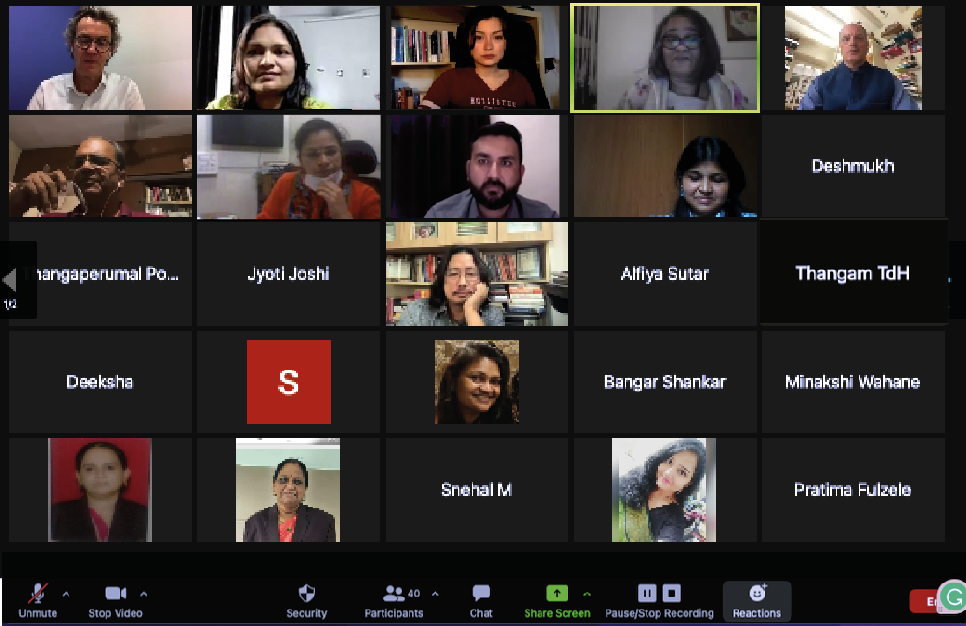Building a community of stakeholders that will help create an integrated solution for a sustainable waste paper value chain
Miss-Collect team would like to thank all participants for sharing their knowledge and donating their time for the Integrated Solution round table. With its business case of “Where people concern, Corporate’s return, Women earn and Children learn” it was important to get a perspective of the people, the industry, eco-preneurs who have worked with social sector models and the local government. Circularity needs support from the government, from the suppliers, the consumers and the future generations.
After having honed in on a product “Growing pots” to create a sustainable waste paper value chain that will apportion greater benefits to the women at the grassroots and enable their children (and the children who work in the waste paper industry) to stay in school and learn, Miss collect also aims to reach out to schools and set up kitchen gardens to sensitize children on the environment and nutrition.
With its mantra of “When people concern, corporates return, women earn, and children learn, the goals were outlined as:
1) Eradicate any child labour in the local paper recycling industry in Pune and send those children back to schools and to monitor the progress of these children through our drop-off and drop-out programmes.
2) Providing local female waste pickers with sustainable (self-supporting) business models, and offering meaningful jobs, training and workshops, thereby supplementing their income.
3) Engage local school children in kitchen gardening projects using these growing pots to teach them about the environment and food production, thereby also reaching out to families as concerned consumers.
4) Involve local businesses and corporates as suppliers of waste paper, as CSR donors or as eco-preneurs with the ability to teach and upskill women in socially minded businesses.
The objective: To explore and identify steps to create a sustainable waste paper value chain that will benefit children of waste collectors. To reskill and upskill women in the waste paper industry, and to involve local school children in the veggie@school programme to raise awareness about the environment.
Addressing the pieces of the puzzle that would then demonstrably make up for a whole business case, where our esteemed speakers:
Dr. Ketaki Ghatge, Solid waste management Department, Pune Municipal Corporation, a public Health Officer who has devoted herself to development and planning issues, in solid waste and natural resource management, energy conservation and sanitation. Engaged in field work, education/awareness campaigns, training and evaluation programmes, policy planning, analysis, project coordination and implementation, on a variety of international projects funded globally, including by the European Union and GIZ, she is currently a nodal officer for Swach Survekshan under the national Swachh Bharat Mission.
Mr. Amol Chandekar, a mechanical engineer with over 30 years of experience in the Indian/ global paper Industry, with a deep understanding of the globally growing paper products market and the fluctuating trends thereof.
Mr. Deep Jyoti Sonu Brahma, experienced in building collaborative engagement spaces between agriculture, education, and health, particularly nutrition streams. With over 18 years of experience working with young people, teachers, farmers, and vulnerable communities across the country, he has been involved in envisioning exercises, design, development, and implementation of various capacity building initiatives on rural school development, SHGs, FPOs and other Community-Based Organizations as also mentoring young social entrepreneurs. A member of Catalyst2030 Global and India Chapters, he is a recipient of the prestigious Ashoka Fellowship in the year 2015. He has contributed to the development of resource material on “Adolescent Development Program” jointly published by UNFPA and NCERT. He is co-founder and Director of a Non-profit enterprise called “Farm2Food Foundation” based out of Assam, India.
Through a project-based learning approach, students learn science and mathematics while setting up their own School Nutrition Garden. The farmpreneur program has covered more than 350 schools across the state of Assam.
Ms. Seema Agarwal, a marketing & business development professional, passionate about ‘Toxin-Free Lifestyle’. With over 2 decades of experience in leading teams of well-known FMCG Brands, she founded merafarmer.com, which enables farmers to get the best price for their produce while ensuring that concerned consumers get the best products even as they eliminate toxic packaging and chemicals. As a director of Sustainable Living Integrated Solutions Pvt Ltd she has been actively engaged in projects related to Urban Farming, Sustainable Development, Life skill Training and Women Empowerment.
The presentations were followed by reflections as our audience included Principals of schools, STEM teachers and coordinators, Recycling industry representatives, and Eco-preneurs. A questionnaire which touched upon the issues at hand for implementation in Pune was also administered.
There was demonstrable interest from all participants, and the conversation established the need for such a project in no uncertain terms. Pune Municipal Corporation has pioneered several waste management that are aligned to its philosophy of building a resilient city and would be open to a project that involves recycling of paper and enables school children in its over 600 schools to learn about kitchen gardens. The experiments in school garden in Assam have proved that children can not only successfully grow gardens to feed themselves but also sell their produce locally, they’re by engaging with larger communities and learn economics alongside their regular school subjects. Upskilling women so that they can earn more while taking some time and effort has proven to make them even more independent and self-reliant.
The roundtable provided participants with the underpinning knowledge required successfully to complete the enterprise module.
Suchismita Pai

Recent Comments